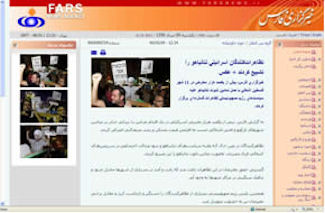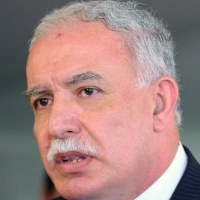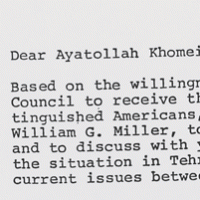![]()
Sun, Aug 07, 2011 | The Meir Amit Intelligence and Terrorism Information Center
“Revolutionary wave has reached Israel”: Iranian media and Israel’s wave of social protests
Last week the Iranian media provided extensive coverage of the growing wave of social protests in Israel, portraying it as yet another sign of the gradual disintegration of Israel.
News agencies argued that the unprecedented social protests reflect the severe problems facing Israel’s government and society. The Iranian media also pointed out links between the expanding protests in Israel and the popular uprisings that broke out in the Arab world this past year.
IRNA, the official news agency, said last weekend that “the protest of the Jewish demonstrators, themselves occupiers of Palestinian land,” has become a new problem for the “Zionist enemy”. According to the news agency, Israeli society is facing many problems, including high-level corruption, discrimination, inflation, unemployment, and social issues. Taken together with Israel’s defeat at the hands of Hezbollah in the second Lebanon war, these problems will likely speed up the elimination of the “Zionist regime” (IRNA, July 30).
Gerdab, a website affiliated with the Revolutionary Guards, reported the wave of protests in Israel under the headline “Revolutionary wave has reached Israel”, arguing that it is the Israeli government’s policy of occupation and settlement which led to the public protests. The Israeli government focused on building settlements and continuing the occupation, ignoring the citizens who are opposed to this policy. Israeli citizens’ opposition to the policy of their government has increased, and they believe that it is time for a real revolution in Israel (Gerdab, July 31).
Fars News Agency emphasized the major role played by social networks in leading the social protests in Israel, similar to the role it played in the popular uprisings in the Arab world. A commentary article published by the news agency two weeks ago said that, at the height of the wave of uprisings in the Arab world, Israel’s leaders had confidence in the stability of the “Zionist regime” and even proudly declared that Israel was an “island of stability” in the stormy waters of the Middle East. The demonstrations and strikes of the last several days exposed the truth about Israel’s weakness. The population of Israel consists of the poor and the rich, radical religious right-wingers and secular people, and the differences of opinion between the various sectors of Israeli society grow stronger with each day. In the first few months of the demonstrations in the Arab world, “the rulers of Tel-Aviv” declared that those demonstrations were very distant from Israel, but looking at Facebook pages in recent months shows that, similarly to young people in Arab countries, the young Zionists living in Israel began their protest on the internet and on social networks.
According to Fars, it is not the first time that Facebook has been a cause for concern for Israel’s leaders. Sensitive military information previously exposed on the social network forced the IDF to prohibit members of the military from using it. Afterwards, Israel was troubled by Palestinian youngsters’ use of Facebook to stir a third intifada.
The news agency noted that two thirds of Israel’s citizens are Arabs and orthodox Jews, estimating that the wave of protests these sectors of society can create in Israel is so powerful that no Israeli leader will ever dare refer to Israel as an “island of stability” (Fars, July 24). The conservative daily Qods also discussed the wave of protests in Israel, estimating that it reflects the process of Israel’s disintegration.
An editorial published by the daily last week said that Israel’s survivability over the years was made possible thanks to three elements: “the Holocaust fairy tale”, used by Israel to gain international support; the establishment of regional coalitions with Iran and Sudan and later also with Turkey and Egypt; and influence and control over the world’s financial institutions.
Now, nothing remains of these three elements, which Israel used to safeguard its security and stability. The regional alliances into which Israel entered in the past have fallen apart as a result of regional developments. The international sympathy for Israel, motivated by the memory of the Holocaust, shifted to the Palestinians as a result of the “Gaza holocaust”, reflected in European boycotts of Israel and war crimes lawsuits filed by Western institutions against Israeli leaders. The last foundation Israel has left to secure its existence is the economic foundation, but the developments in the U.S. and Europe point to the collapse of the liberal economy, which can be seen even now in the protest against gas and housing prices in Israel.
The economic crisis in Israel comes as no surprise, as it is considered the 51st state of the U.S. Therefore, it had to be affected by the housing crisis and the collapse of hundreds of financial institutions and banks in the U.S. The collapse of the Zionist-controlled economic institutions in the U.S. and Europe struck a major blow to the important economic foundation necessary for Israel’s existence and to the flow of funds to Israel from the West.
Israel, which up to several years ago put most of its efforts into securing its borders, now has to figure out a way to guarantee housing and gas for thousands of “immigrant Jews” (Qods, July 31).
The daily Keyhan, whose Monday, August 1 headline was dedicated to the protests in Israel, claimed that the economic and political instability in Israel resulted in its downfall and in the disintegration of the “Zionist regime” from the inside, while the region’s other countries are swept by the Arab spring.



 RSS
RSS











“Revolutionary wave has reached Israel”: Iranian media and Israel’s wave of social protests | #Iran #Israel http://bit.ly/pnXNes
“Revolutionary wave has reached Israel”: Iranian media and Israel’s wave of social protests | #Iran #Israel http://bit.ly/pnXNes